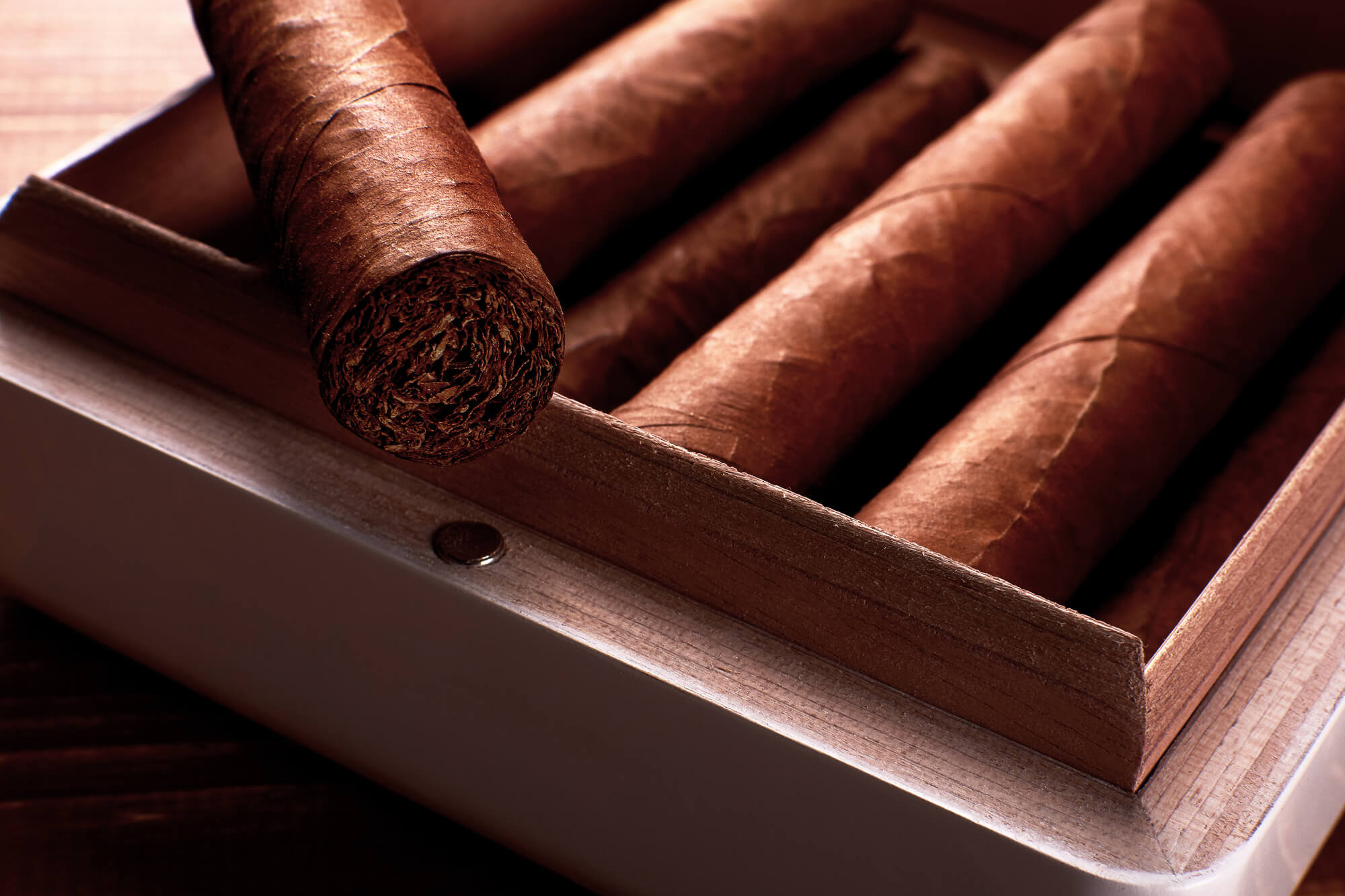If you're a cigar aficionado, you already know that smoking a great cigar is an experience unlike any other. The flavor, aroma, and texture of a perfectly rolled cigar can transport you to another world, making even the most mundane moments feel special. But if you want to take your cigar game to the next level, you need to know about the art of cigar aging in a humidor cigar box.
Cigar aging is the process of storing cigars in a controlled environment for an extended period, allowing them to develop more complex flavors and aromas over time. While many cigar smokers are content to smoke their cigars fresh from the store, true cigar connoisseurs understand the value of aging their cigars to perfection.
While cigar aging may seem complex and time-consuming, the rewards are well worth the effort. A perfectly aged cigar can offer a depth and complexity of flavor that's simply not possible with a fresh cigar. And when you're smoking a cigar that you've aged yourself, you can take pride in the fact that you've played a part in creating a truly exceptional smoking experience.
So, whether you're a seasoned cigar smoker or just starting out, consider taking the time to explore the art of cigar aging. With a little patience and a lot of dedication, you can create a collection of cigars that are truly one-of-a-kind.

The Aging Process
A cigar’s aging process is a fascinating and complex journey that transforms the flavor, aroma, and texture. When a cigar is stored in a controlled environment, such as a humidor cabinet, the oils, and flavors in the tobacco continue to develop, mellowing out any harshness and enhancing the subtle nuances that make each cigar unique.
To understand this process, it’s best to delve into the cigar’s production. A cigar is made up of a blend of tobacco leaves that have been aged and fermented before being rolled into the cigar shape. These leaves undergo several stages of aging and fermentation, during which time they develop their flavor profiles.
What Are the Key Factors That Affect the Aging Process?
During cigar aging, temperature and humidity are the two most crucial factors that affect the chemical changes in the cigar. The ideal temperature for cigar aging is between 65 and 70 degrees Fahrenheit, while the ideal humidity level is between 65% and 72%. This is where the humidor comes into play.
A humidor is the most popular storage device for aging cigars because it provides a controlled environment that maintains these optimal conditions for aging. Moreover, regular rotation and inspection of cigars during the aging process ensure that they age evenly and remain in good condition. When a cigar is aging properly, you won’t see signs of mold or damage.

What Are the Chemical Changes that Occur During the Aging Process?
Cigars undergo several chemical changes during aging, affecting their flavor, aroma, and texture. These changes include oxidation, fermentation, sweating, and evaporation.
-
Oxidation
Oxidation occurs when the oxygen in the air reacts with the tobacco in the cigar, causing a change in the chemical composition of the tobacco. The oxidation process can have several effects on the cigar’s flavor profile. For instance, oxidation can smooth out any harshness in the flavor while improving the cigar’s subtle nuances. This can lead to a more complex and enjoyable smoking experience.
In addition to affecting the cigar's flavor, oxidation can also affect its aroma and color. As the tobacco undergoes oxidation, it develops new aromas and a darker color, which is often a sign of a well-aged cigar.
However, it's important to note that too much oxidation can also negatively affect the cigar's flavor. Over-aging a cigar can cause the flavor to become flat or lose its complexity, resulting in a less enjoyable smoking experience. For this reason, careful monitoring is crucial to ensure that the cigar is aging properly. The oxidation process can enhance your favorite cigar's flavor profile with the right conditions and care.
-
Fermentation
Fermentation is another chemical change that occurs during the aging process of a cigar. When harvested, tobacco leaves contain harsh chemicals and flavors that need to be broken down through fermentation to develop a smoother and more refined flavor profile.
During the fermentation process, bacteria and yeast break down the chemicals in the tobacco, which helps enhance the cigar's flavor and aroma. This process is similar to the process used to make wine or cheese. When a cigar is aged, the fermentation process can continue to occur, further breaking down the harsh chemicals in the tobacco and enhancing the flavors. In addition to affecting the cigar's flavor, fermentation can also impact the texture and draw of the cigar. As the tobacco undergoes fermentation, it can become more supple and pliable, improving the cigar's draw and burn.
However, it's worth noting that over-fermentation can negatively impact the cigar's flavor. If the fermentation process goes too far, the cigar can become too acidic and lose complexity, resulting in a less enjoyable smoking experience. Therefore, it's important to monitor the fermentation process and ensure proper cigar aging carefully.
-
Sweating
Sweating is another change that occurs during the aging process of a cigar. As a cigar ages, it releases moisture through its wrapper, which can improve the draw and burn of the cigar. This process is often referred to as "sweating." During sweating, the cigar's moisture can also help improve its flavor and aroma and reduce any harshness in the flavor while enhancing its subtle nuances.
In addition to improving the cigar's flavor and aroma, sweating can improve its texture and draw. The cigar can become more supple and pliable as it releases moisture, improving its draw and burn.
However, too much sweating can cause the cigar to become too moist, resulting in a soggy cigar that's difficult to smoke. Consequently, it's crucial to keep a close eye on the sweating process and ensure that the cigar is aging correctly. By maintaining optimal conditions and handling the cigar with care, the sweating process can enhance its flavor profile and create a pleasurable indulgence like no other.
-
Evaporation
Evaporation is another significant change that takes place during the cigar aging process. As cigars age, they lose some moisture, resulting in a higher concentration of flavors in the remaining tobacco. This process occurs naturally as the cigar is exposed to the controlled environment of the humidor. As moisture evaporates from the cigar, it leaves a more robust flavor profile often described as complex and well-rounded.
The amount of moisture that evaporates from a cigar during aging depends on the cigar's blend, size, and storage conditions. Full-bodied cigars that use high-quality tobacco require extended aging periods for proper evaporation. In contrast, milder cigars may only need a few months to achieve the same effect.
While evaporation can enhance the flavor of a cigar, over-aging can lead to an overly dry cigar that may lack the complexity typically associated with well-aged cigars. For this reason, cigar enthusiasts must balance aging and over-aging, ensuring that their cigars are aging properly and achieving the desired depth of flavor.
The evaporation that occurs during cigar aging is essential in developing a cigar's flavor profile. By aging cigars properly and monitoring evaporation levels, cigar enthusiasts can achieve an unparalleled depth of flavor.
How Can I Age My Cigars?
Properly aged cigars take on a complexity of nuanced and distinct flavor. The aging process allows the tobacco's flavors to meld and evolve, creating a depth of flavor that a freshly rolled cigar can't match.
Although aging cigars doesn’t involve a difficult process, it requires some basic knowledge and attention to detail. Aging cigars requires attention to detail and patience, but the results are well worth the effort. By following a few essential steps, cigar enthusiasts can ensure that their cigars age properly and develop the depth and complexity of flavor that is the hallmark of a well-aged cigar.
Step 1: Select the right cigars.
Selecting the right cigars is the first step in the process of aging cigars. Full-bodied cigars with high-quality tobacco are the best candidates for aging. Look for cigars that have a rich flavor profile and are made with high-quality tobacco. Avoid cigars already past their prime or poorly stored because these will not age well.
Furthermore, not all cigars age at the same rate. Since different blends and sizes will age differently. It's important to research the cigars you plan to age and how long they should be aged.
Step 2: Choose the right environment.
The second step in aging cigars is choosing the right environment. The ideal environment for aging cigars is cool, dark, and humid. A humidor is the best storage device for aging cigars because it maintains a steady temperature and humidity level. Other storage devices, such as Tupperware® or Ziploc® bags, can also be used, but they require more frequent monitoring and maintenance.
When selecting a humidor, look for high-quality wood, such as Spanish cedar. The humidor should also have a good seal and be large enough to hold all of the cigars you plan to age.
Step 3: Maintain the proper temperature and humidity levels.
Temperature and humidity are critical factors that affect the aging process. As noted earlier, the optimal temperature for aging cigars falls within the range of 65 to 70 degrees Fahrenheit, while the ideal humidity level should be maintained at around 65% to 72%. Since temperature and humidity fluctuations can significantly impact the aging process, it's essential to maintain a consistent environment.
Maintaining the proper temperature and humidity levels is easier with a digital hygrometer and thermometer. These devices will allow you to monitor your humidor's temperature and humidity levels and make any necessary adjustments.
Step 4: Rotate and inspect cigars.
Regular rotation and inspection of cigars during aging are also critical to ensuring that they age evenly and remain in good condition. This means periodically moving the cigars around in the humidor to ensure they are all exposed to the same conditions. Inspecting the cigars during rotation is also essential to ensure no signs of mold or damage.
During the inspection, look for any signs of mold or damage, such as cracks or splits in the wrapper. If you find any damaged cigars, remove them from the humidor immediately to prevent them from damaging the other cigars.
By selecting the right cigars, choosing the right environment, maintaining
optimal temperature and humidity levels, and regularly rotating and inspecting cigars, cigar enthusiasts can ensure that their cigars age properly and achieve a depth and complexity of flavor that's impossible with a fresh cigar.
What Are the Best Cigars for Aging?
Not all cigars are suitable for aging. Here are the best types of cigars to age:
-
Full-Bodied Cigars
Full-bodied cigars with high-quality tobacco are the best candidates for aging. Examples include Padron, Opus X, and Liga Privada.
-
Cuban Cigars
Cuban cigars are known for their flavors and aromas, which develop even further during aging. Examples include Cohiba, Montecristo, and Romeo y Julieta.
-
Limited Edition Cigars
Limited edition cigars are often made with tobacco that’s only available for a limited time. These cigars are often highly sought-after and can be difficult to find. Examples include Davidoff Limited Edition, Arturo Fuente Don Carlos Edicion de Aniversario, and Tatuaje Monster Series.
The length of time a cigar should be aged depends on several factors, including the cigar's blend, size, and storage conditions. In general, full-bodied cigars with high-quality tobacco should be aged for a minimum of one year, while milder cigars may only need a few months of aging.
Are You Looking for Top-Quality Humidor Cigar Boxes?
Mastering the art of cigar aging is the key to elevating your cigar-smoking pleasure to new heights. By understanding the aging process and the proper techniques for aging cigars, you can curate a collection of humidor cigars that are unique and unparalleled in flavor and aroma.
At 1st Class Humidors, we have a wide selection of high-quality options. We offer cabinet humidors in various sizes and styles to accommodate small and large cigar collections. Contact us today to learn more about our products and find the perfect humidor cabinet.




